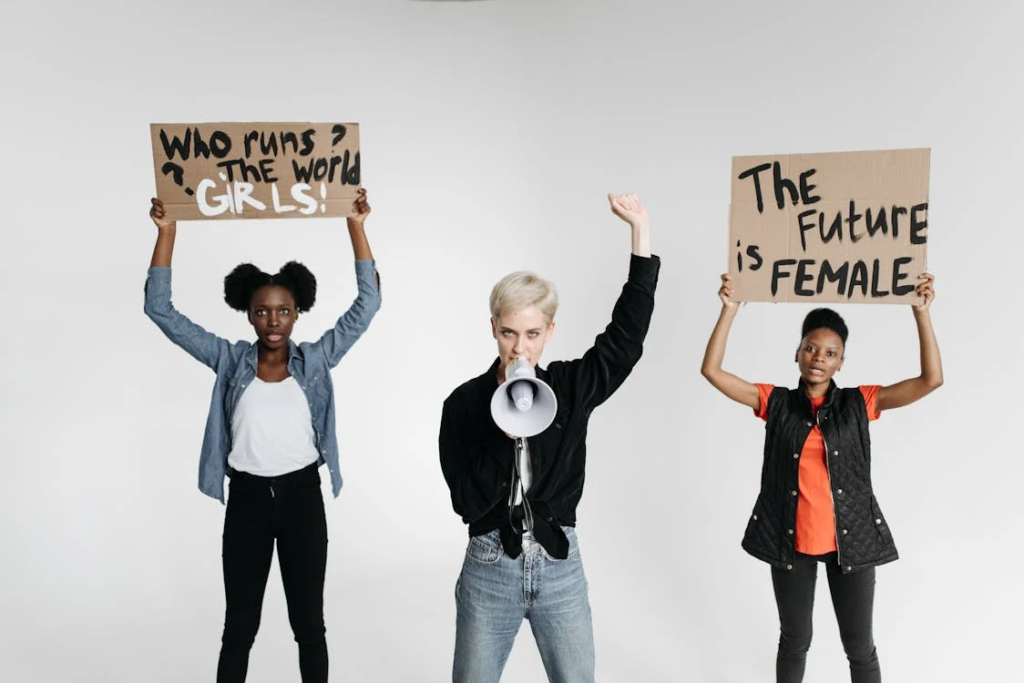Throughout history, societal norms have imposed numerous restrictions on women’s behavior, often under the guise of maintaining “not ladylike” being a bad decorum. These simple rules have ranged from dictating personal choices to limiting professional aspirations. Here are 28 examples of normal activities and decisions that women have been discouraged from pursuing, accompanied by real-life anecdotes illustrating these constraints.
1. Engaging in Playful Activities

Many women recall being denied the simple joy of play during their childhood due to rigid gender roles. One woman shared that her grandmother insisted she stay indoors to clean while her male relatives played outside. Her grandmother sternly said, “Girls don’t play. We take care of the home,” enforcing the belief that fun and leisure were luxuries reserved for boys.
2. Speaking Freely

For generations, the expectation for women to remain silent unless spoken to has suppressed their voices. A contributor explained how her father enforced this rule strictly, discouraging her from expressing herself or joining in conversations. This limitation led to ongoing struggles with confidence and self-expression even in adulthood, leaving her to unlearn the idea that her words were less valuable.
3. Pursuing Male-Dominated Careers

Women entering traditionally male professions often face resistance, stemming from outdated notions of capability and un-ladylike behavior. One woman described how she pursued a career as a firefighter despite being told it wasn’t fit for her gender. Defying stereotypes, she graduated at the top of her academy class, proving that determination and skill are not bound by gender.
4. Participating in Strength Training – Not Ladylike?

The outdated belief that women should avoid building muscle because it detracts from femininity still lingers. A woman mentioned how unsolicited comments targeted her muscular physique, with strangers questioning her attractiveness. Despite this criticism, she remained proud of her accomplishments and reminded herself that her strength had nothing to do with others’ opinions.
5. Wearing Comfortable Clothing

Clothing choices, such as opting not to wear bras, have been policed in the name of modesty. One individual shared that her ex-partner demanded she always wear a bra to prevent other men from looking at her, framing her comfort as a lack of respect for their relationship. Such attitudes reflect a troubling tendency to prioritize control over women’s autonomy.
6. Choosing Practical Hairstyles

Personal grooming decisions are often subjected to scrutiny. A woman shared how her ex-boyfriend forbade her from shaving her head, claiming it was unattractive. Defying him, she embraced the change, finding freedom and empowerment in taking ownership of her appearance. This act of self-expression became a declaration of independence.
Read More: Why Modern Women Hate Men
7. Expressing Emotions Openly

The stereotype that women are overly emotional has led to the dampening of emotional expression. Women have been told to suppress their feelings to maintain a composed and “ladylike” image. This suppression not only reinforces gender stereotypes but also stifles personal authenticity and emotional well-being.
8. Pursuing Higher Education

Ambitions for higher education have often been stifled by those who feel threatened by women’s intelligence. One woman shared how her ex criticized her interest in feminist issues and belittled her academic achievements. Unwavering, she pursued advanced degrees and eventually married someone who respected her intellect and shared her values.
9. Maintaining Friendships with the Opposite Sex

Jealousy and insecurity often lead some men to restrict their partners’ friendships with the opposite sex. One woman described how her ex was uncomfortable with her male friends, reflecting a lack of trust. By challenging such behavior, she reclaimed her right to maintain meaningful connections, regardless of gender.
10. Traveling Independently

Women who wish to travel solo or without a partner often face trouble framed as concern for their safety. While safety is a valid consideration, this sentiment can also be rooted in the desire to control women’s autonomy. By exploring the world independently, many women defy these constraints and gain enriching experiences.
11. Making Financial Decisions Apparently Not Ladylike

Financial independence is another area where women have been undermined. Partners insisting on holding the control of household money matters often strip women of their agency, making them feel powerless. Emphasizing the importance of equal financial participation can pave the way for healthier relationships built on trust and respect.
12. Speaking Up in Public Settings

The notion that assertive women are “bossy” or “too opinionated” has long stifled voices. In meetings or social gatherings, women have been advised to hold back, leaving them out of important discussions. Overcoming these societal biases requires active encouragement to embrace and celebrate women’s contributions.
Read More: Woman’s Husband Created a ‘Schedule’ for Her To ‘Become a Better Wife’ – This Was Her Response
13. Engaging in Sports

Certain sports, especially those considered “aggressive,” are still seen as inappropriate for women. Martial arts, contact sports, or weightlifting are criticized as being too masculine. Women in these fields, however, consistently demonstrate that physical strength and femininity are not mutually exclusive.
14. Driving or Owning a Car

In some parts of the world, women have faced resistance to driving or owning vehicles, either through cultural norms or explicit bans. This limitation restricts their mobility and independence, highlighting the importance of dismantling barriers that prevent women from accessing equal opportunities.
15. Living Alone

The decision to live alone is often met with criticism or fearmongering. Women are told it’s unsafe or inappropriate, as societal expectations push them toward familial or dependent living arrangements. Living independently, however, allows many women to discover self-reliance and empowerment.
16. Having Tattoos or Piercings – Considered Not Ladylike

Body modifications have often been labeled as rebellious or unfeminine. A woman shared that her tattoos were met with disapproval, yet they served as a means of personal expression and identity. Embracing these choices challenges outdated judgments about appearance.
17. Pursuing Leadership Roles

The belief that women are too emotional or nurturing to lead remains pervasive in many workplaces. Women pursuing leadership positions are often doubted or scrutinized more harshly than their male counterparts. Despite these biases, countless women have shattered stereotypes, proving that empathy and decisiveness can coexist and even strengthen leadership.
18. Playing Video Games

Gaming has long been stereotyped as a male pastime, leaving women to face gatekeeping and doubts about their skills. One woman shared how she was often quizzed about her knowledge of games, as if her interest wasn’t genuine. By unapologetically enjoying gaming, women are challenging the misconception that hobbies are gender-specific.
Read More: 10 Silent Actions That Can Hurt Your Wife’s Self-Confidence
19. Drinking Alcohol in Social Settings

Social drinking has been stigmatized for women, who are often told it’s unseemly or that it reflects poorly on their character. This double standard ignores the fact that adults, regardless of gender, are equally entitled to enjoy a drink in moderation without fear of judgment or reputational harm.
20. Dancing Freely

Dancing exuberantly or exploring certain dance styles has been criticized as immodest or attention-seeking. Women who enjoy dancing often hear comments implying that their movements invite inappropriate attention. Rejecting these judgments, many women find joy and self-expression in dance, celebrating their individuality.
21. Laughing Loudly

The expectation for women to laugh softly or delicately is another way society polices behavior. A woman shared how her hearty laugh was deemed “unladylike” by her partner, making her self-conscious. Over time, she learned to embrace her natural laugh as a part of her personality, refusing to shrink herself to fit societal norms.
22. Eating Hearty Meals

Eating habits are another area where women face judgment. The idea that women should only eat small portions to appear dainty persists, leading to unhealthy relationships with food. By openly enjoying meals without shame, women challenge the harmful narratives surrounding diet and femininity.
23. Rejecting Advances – How Not Ladylike

Asserting boundaries and rejecting romantic advances often results in women being labeled rude or difficult. This response reflects a broader cultural problem of entitlement to women’s attention. By prioritizing their own comfort and autonomy, women are redefining how consent and respect should function in relationships.
24. Discussing Politics or Controversial Topics

Women have been discouraged from engaging in political or controversial conversations, often being told it’s not their place. This suppression limits their ability to influence important discussions and perpetuates the stereotype that women should remain neutral. Breaking this silence, women are proving their voices are essential in shaping society.
Read More: 9 Phrases Your Partner Might Use That Could Indicate Verbal Abuse, According to Experts
25. Showing Body Hair

The stigma surrounding body hair for women remains a deeply ingrained societal expectation. Women who choose to forego hair removal often face criticism or ridicule, as if their natural state is unacceptable. By embracing their choice, these women are challenging narrow definitions of beauty and encouraging acceptance.
26. Wearing Minimal Makeup

Opting out of makeup is frequently met with unwarranted comments, such as being told they look tired or less professional. This pressure to enhance their appearance reinforces the idea that women’s value is tied to their looks. By embracing natural beauty, women advocate for authenticity over societal approval.
27. Initiating Romantic Relationships

Women who make the first move in dating are often labeled as forward or desperate. This stigma discourages them from taking charge of their own romantic pursuits. By challenging these norms, women are reclaiming the power to express interest without fear of judgment or rejection.
28. Prioritizing Career Over Family – So “Not Ladylike”

When women focus on their professional aspirations, they are frequently told they’re neglecting traditional family roles. This criticism assumes that women’s worth is defined by their ability to nurture, rather than their ambitions. By prioritizing their careers, women assert that fulfillment comes in many forms, all of which deserve respect.
Conclusion On What’s Considered Not Ladylike

These 28 examples highlight the pervasive restrictions and societal expectations that women have faced, often reinforced by loved ones or partners. While these norms may vary in severity, they collectively contribute to limiting women’s choices and autonomy. By challenging these outdated ideas and embracing their individuality, women are carving out spaces where they can thrive without fear of judgment or constraint. Every step taken to defy these norms paves the way for a more equitable and inclusive society.
Read More: If You’re Looking for Respect, Here Are 18 Behaviors You Need to Leave Behind

